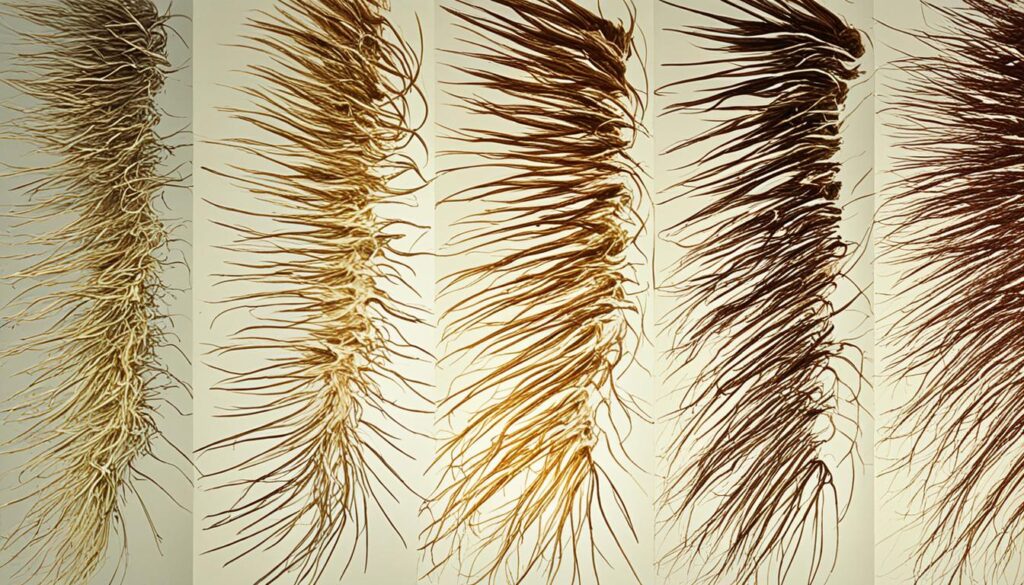Stress can have a significant impact on women’s hair health, leading to hair loss in some cases. It is essential to understand the different types of hair loss associated with high stress levels and their causes.
Three types of hair loss are often linked to stress in women:
- Telogen Effluvium: This occurs when significant stress pushes hair follicles into a resting phase, resulting in sudden hair loss.
- Trichotillomania: It is an irresistible urge to pull out one’s hair as a way of coping with negative feelings such as stress.
- Alopecia Areata: This condition involves the immune system attacking hair follicles, possibly triggered by severe stress.
By understanding the relationship between stress and hair loss, women can take proactive steps to prevent and reverse stress-related hair loss.
Key Takeaways:
- Stress can contribute to hair loss in women, and there are different types of stress-related hair loss.
- Telogen Effluvium, Trichotillomania, and Alopecia Areata are the common types of hair loss associated with stress.
- Managing stress levels can help prevent and reverse stress-related hair loss.
- Seeking professional support and adopting stress management techniques are crucial for maintaining healthy hair.
- Addressing underlying stressors and maintaining a balanced lifestyle are key for promoting overall hair health.
The Link Between Stress and Hair Follicle Stem Cells
Chronic stress can have a detrimental impact on hair follicle stem cells, which can ultimately lead to hair loss. Understanding the connection between stress and hair health is crucial for finding effective solutions to combat stress-induced hair loss. Let’s dive deeper into the intricate relationship between stress and hair follicle stem cells.

Our hair growth cycle consists of three main stages: anagen, catagen, and telogen. The anagen phase is the active growth stage, while the catagen phase is a transitional phase, and the telogen phase is the resting phase where hair naturally sheds. Under normal circumstances, these stages occur in a harmonious rhythm.
However, chronic stress can disrupt this delicate balance, leading to hair loss. Research indicates that stress can cause telogen hairs (resting hairs) to fall out at a faster rate, resulting in increased hair shedding. Moreover, stress can shorten the anagen phase, which means hair spends less time in the growth stage before entering the resting phase.
Scientists have also discovered that stress hormones, such as corticosterone, play a role in inhibiting hair follicle stem cell activity. These hormones act on the dermal papilla, which is a cluster of cells responsible for hair follicle regeneration. When stress hormones hinder the dermal papilla’s ability to secrete the growth factor molecule GAS6, hair follicle stem cells may not receive the necessary activation signals for hair regrowth.
Restoring GAS6 levels or managing stress levels effectively could potentially help promote hair regrowth in individuals experiencing stress-induced hair loss. By addressing stress and its impact on hair follicle stem cells, we may uncover innovative solutions to combat stress-induced hair loss and promote healthier, fuller hair.
Telogen Effluvium: Hair Loss Triggered by Stress
Telogen effluvium is a condition characterized by sudden hair shedding and loss due to shock or stress. When stress disrupts the natural growth pattern of hair, it can result in more frequent hair fall, leading to stress-related hair thinning. This condition is often noticeable when clumps or handfuls of hair fall out, particularly during activities like shampooing or brushing.
Telogen effluvium typically resolves on its own over time as the hair follicles regain their normal growing phase. However, managing the underlying stress and adopting specific preventative measures can help encourage regrowth and prevent further hair thinning.
Preventing Stress-Related Hair Loss
Here are some effective ways to prevent stress-related hair loss:
- Stress management techniques: Implement stress reduction practices such as mindfulness meditation, deep breathing exercises, or yoga to help alleviate the impact of stress on the body and hair follicles.
- Address emotional stressors: Identify and address any emotional stressors or triggers in your life that may be contributing to hair loss. Seeking professional counseling or therapy can provide valuable guidance and support.
- Healthy lifestyle choices: Maintain a healthy diet rich in essential nutrients, vitamins, and minerals that support hair growth. Regular exercise, adequate sleep, and reducing alcohol and tobacco consumption can also contribute to overall well-being and hair health.
- Topical treatments: Consider using topical medications like minoxidil, approved by the FDA for promoting hair regrowth. Consult with a dermatologist to determine the appropriate treatment for your specific needs.
By adopting these strategies and actively managing stress, you can help prevent stress-related hair loss and support the health and longevity of your hair.

| Telogen Effluvium | Prevention Strategies |
|---|---|
| Condition characterized by sudden hair shedding and loss |
|
The Difference Between Stress-Related Hair Loss and Female Pattern Baldness
When it comes to women’s hair loss, it’s important to understand the distinction between stress-related hair loss and female pattern baldness. While both can cause hair thinning and loss, they have different underlying causes and treatment approaches.
Stress-Related Hair Loss (Telogen Effluvium)
Stress-related hair loss, also known as telogen effluvium, is typically triggered by high levels of stress. It can result in sudden hair shedding and affect hair all over the scalp. Telogen effluvium occurs when stress pushes hair follicles into a resting phase, causing them to shed prematurely.
To address stress-related hair loss and promote regrowth, it’s essential to focus on managing the underlying stress. This can be achieved through stress-reducing techniques such as exercise, relaxation strategies, and seeking support from mental health professionals.
Female Pattern Baldness (Androgenic Alopecia)
Female pattern baldness, also known as androgenic alopecia, is a hormonal hair loss condition that may be hereditary. It typically follows a specific pattern of hair thinning and loss, starting with a straight line in the middle of the head.
Unlike stress-related hair loss, female pattern baldness requires a different approach to treatment. Seeking medical advice and considering interventions such as topical medications, hair transplants, or laser therapy may be necessary to manage this condition effectively.
Understanding the difference between stress-related hair loss and female pattern baldness is crucial when it comes to determining the most appropriate treatment options.
Conclusion
Understanding the link between stress and hair loss in women is crucial for prevention and treatment. The negative impact of stress on hair health can be managed through various techniques aimed at reducing stress levels and promoting self-care. By prioritizing stress management and adopting healthy habits, women can minimize the risk of stress-related hair loss and maintain healthy hair growth.
To prevent stress-related hair loss, incorporating regular exercise into your routine can help reduce stress levels and improve overall well-being. Engaging in relaxation strategies such as meditation, deep breathing exercises, or yoga can also effectively relieve stress and support hair health. Seeking support from mental health professionals can provide valuable guidance in managing stress and finding coping mechanisms.
In addition to stress management, maintaining a healthy lifestyle is essential for promoting hair health. A well-balanced diet rich in essential nutrients like vitamins, minerals, and proteins can nourish the hair follicles and encourage healthy growth. Proper hair care practices, such as using gentle shampoos and conditioners, avoiding excessive heat styling, and minimizing the use of chemical treatments, can also contribute to maintaining strong and resilient hair.
FAQ
Can stress cause hair loss in women?
Yes, stress can be a contributing factor to hair loss in women. High stress levels can lead to three types of hair loss: telogen effluvium, trichotillomania, and alopecia areata.
How does stress affect hair follicle stem cells?
Chronic stress can impair hair follicle stem cells, leading to hair loss. Stress hormones inhibit hair follicle stem cell activity, disrupting the hair growth cycle and causing faster hair fall.
What is telogen effluvium, and how is it related to stress?
Telogen effluvium is a condition characterized by sudden hair shedding and loss due to shock or stress. Stress can disrupt the natural growth pattern of hair, resulting in more frequent hair fall.
How can stress-related hair loss be prevented?
Stress-related hair loss can be prevented by managing stress levels through techniques such as exercise, relaxation strategies, and seeking support from mental health professionals. Maintaining a healthy lifestyle and proper hair care can also support overall hair health.
How does stress-related hair loss differ from female pattern baldness?
Stress-related hair loss, known as telogen effluvium, is sudden and affects hair all over the scalp. It can be resolved by addressing the underlying stress. Female pattern baldness is a hormonal hair loss condition that may be hereditary, with a noticeable pattern of hair loss. Medical advice can help differentiate and address these different types of hair loss.

